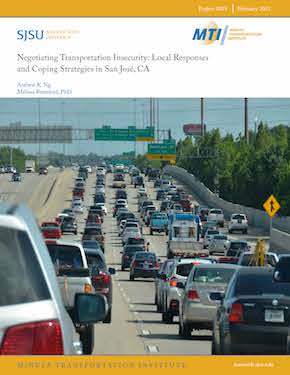- 408-924-7560
- mineta-institute@sjsu.edu
- Donate
Negotiating Transportation Insecurity: Local Responses and Coping Strategies in San Jose, CA
People rely on transportation every day to access food, work, and social activities. Transportation insecurity—the lack of regular access to adequate transportation—can therefore cause significant disruptions to livelihoods. Understanding how people experience transportation insecurity in metropolitan areas may contribute to building better transportation systems and help formulate ways to alleviate persistent and underlying transportation issues. In this study, the researchers interviewed San José residents who experience transportation insecurity to better understand their experiences and identify the major ways that they cope with lack of adequate transportation. The researchers then used inductive techniques for thematic text analysis to identify patterns major themes in people's experiences and coping strategies. Findings suggest that people experience transportation insecurity as excess time consumption through congested traffic, convoluted travel schedules, and service complications, which causes worry, anxiety, and missed opportunities due to wasting or losing personal time. Overall, people's experiences and reactions allude to what could be improved in San José’s transportation infrastructure.
ANDREW K. NG
Andrew K. Ng (he/him) is a master’s student in the field of applied anthropology. Being interested in how people interact with transportation, Andrew wanted to study transportation insecurity because they used the bus in San José often before the COVID-19 pandemic and wanted to try to contribute to improving public transit in some form. With this study, they wish to go into government work to focus on public transportation with the aim of helping out more people.
MELISSA BERESFORD
Dr. Melissa Beresford (she/her) is an Assistant Professor in the Department of Anthropology at San José State University. Her research investigates how humans mobilize markets and informal economic institutions to adapt to resource insecurities. Her work has largely focused on (a) how people create locally based alternative economies (e.g., informal, hybridized, pro-poor) to counteract economic and environmental injustice, and (b) the conditions under which such economies can shield people from or counteract resource insecurities. She has conducted fieldwork in South Africa, Latin America, and the United States.
-
Contact Us
San José State University One Washington Square, San Jose, CA 95192 Phone: 408-924-7560 Email: mineta-institute@sjsu.edu






